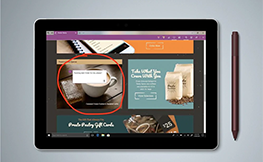
Introducing the Microsoft Surface Go - the smallest, lightest surface yet.
"An inexpensive and highly portable PC like my hybrid tablet has been missing from Microsoft’s Surface line, but that omission ends at the end of August with the release of the Surface Go, a downsized and down-powered equivalent of the Surface Pro."
For the past four years I’ve carried around a tiny 10 inch 2-in-1 tablet. It’s my “Swiss Army Knife” PC. It’s not fast enough for games, not big enough for extended reading, and without enough capacity to hold much on its tiny but fast 64GB hard drive.
But it’s enough for taking minutes in meetings, accessing social media and banking and other websites while travelling, and does a good job of entertaining a restless six year old with movies, Dr Panda games and YouTube while travelling.
An inexpensive and highly portable PC like my hybrid tablet has been missing from Microsoft’s Surface line, but that omission ends at the end of August with the release of the Surface Go, a downsized and down-powered equivalent of the Surface Pro.
The Surface Go is a brand new product from Microsoft, providing a smaller, lighter and more affordable alternative to the popular Surface Pro.
There’s a model with 4GB of RAM and 64GB of SSD but that configuration is unlikely to be palatable for the business market. The business-ready 8GB RAM and 128GB SSD Surface GO is available for $919 including GST in Australia ($835.45 ex GST).
Is the 10.0 inch Microsoft Surface Go a suitable alternative for the $1999 (inc. GST) 12.3 inch Surface Pro?
What do you get and what do you miss out on for less than half of the price?
The table below outlines the differences between the NEW Surface Go and the Surface Pro…
|
|
Surface Go (Pentium, 8GB, 128GB) |
Surface Pro (i5, 8GB, 256GB) |
|
Price (inc GST) |
$919 |
$1999 |
|
Screen size |
10.0 inch |
12.3 inch |
|
Screen resolution |
1800 x 1200 pixels (3:2 ratio) |
2736 x1824 pixels (3:2 ratio) |
|
Connectivity |
1x USB 3.1 (USB type C) |
1x USB 3.0 (USB type A) |
|
Graphics |
Intel 615 (supports 1x 4K monitor) |
Intel 620 (supports 1x 4K monitor) |
|
Windows |
Windows 10 Pro |
Windows 10 Pro |
|
Weight |
522g |
770g |
|
Typical Accessories |
Surface Dock, Pen, Type Cover |
Surface Dock, Pen, Type Cover |
In summary the benefits for the Surface Go over the Surface Pro are:
- Less than ½ of the cost
- USB port is Type-C USB 3.1 (newer/faster but will need adapters for legacy USB Type-A devices)
- More power-efficient CPU and graphics
- Lighter/smaller
The negatives for the Surface Go vs buying a Surface Pro are:
- No dedicated display output (requires proprietary dock or USB video adapter)
- Significantly less CPU performance, and slightly less graphics performance
- Maximum internal storage of 128GB, where Surface Pro available up to 1024GB solid state drive
- Smaller screen may be difficult to read at arm’s length when used with keyboard
Recommendations for the business user…
For business users, the Surface Go is mostly useful as a second PC, or for use by a mobile worker mostly running cloud-based applications. A 4G ready model has been announced for future release, as was the Surface Pro earlier this year.
Like my “Swiss Army Knife” PC, I expect the Surface Go be most popular as a lightweight go-anywhere option. The Go gives you the convenience of an Apple iPad but will run your Word, Excel, Photoshop and act as your base station to all of your technological kit, such as portable hard drives, smart phones, Bluetooth devices. Add the Surface Dock to connect an external mouse/keyboard/monitor when you need to get down to some more serious productivity.
How can Diamond help?
The Surface Go will be available to users in Australia from the 28th of August. Please contact us now to pre-order or further discuss this new product. Give us a call on 1300 307 907 or contact us via the form below.




